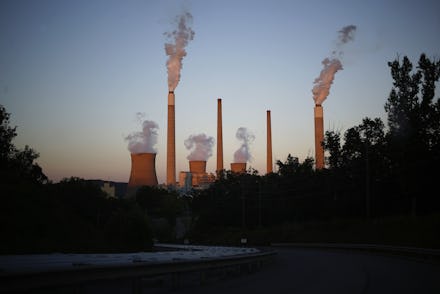Trump's latest rollback of pollution rules has an unexpected critic: energy companies

Since taking office in 2017, President Donald Trump has made it a priority to undo environmental protections passed before him in an attempt to slash red tape for the energy industry, safety be damned. The latest rule change set to be finalized by the administration will upend restrictions on mercury emissions and other toxins that are allowed from power plants. While it may seem like it's a favor for the energy sector that dumped cash into Trump's coffers while he was running for office, Trump's administration has apparently gone too far even for his financial backers' liking. According to the Washington Post, even energy companies are telling Trump that they don't need or want this change.
Unlike a standard Trumpian approach of simply wiping an Obama-era law off the books — as he has done with rules regulating pollution from coal plants, requiring climate assessments for construction projects, protecting waterways and plenty of others — the latest change from the administration will keep a law establishing clean air requirements on the books while completely changing the underlying math on how the government calculates pollution.
As the rule stands currently, the Environmental Protection Agency (EPA) limits the amount of dangerous mercury emissions and other toxins that may be expelled by power plants. The Trump administration claims that there is no need to target these chemicals specifically because air pollution can be addressed without limiting the amount of toxins emitted. Under the change to the Mercury and Air Toxics Standards (MATS) rule, regulators would not be able to calculate the positive health effects experienced by reducing specific pollutants like mercury. As long as air quality is generally getting better as companies adopt new technologies, they will be free to continue sending specific pollutants into the air, regardless of how they impact public health.
Humans are exposed to mercury in a variety of ways, including from eating fish, but excess exposure to inorganic mercury can have serious health consequences. According to the EPA, exposure to high levels of mercury can result in loss of vision, strange tingly sensations throughout the body, lack of coordination, impairment of speech and hearing, and muscle weakness. The impact of exposure is worse for children and still-developing young adults, who can suffer from adverse effects to cognitive thinking, memory, attention, language, motor skills, and visual spatial skills.
So why risk the potential damage done by allowing power plants to pump this neurotoxin and other pollutants into the air? Typically, the answer would be because industry interests asked for it and the Trump administration has a habit of bending over backward to do favors to those who line its pockets. But in this case, even the companies that are being granted the right to pollute without consequence are asking the Trump administration to reconsider the change. According to the Washington Post, the Trump administration has been told by some of the largest utilities and power plant companies that the change is “entirely unnecessary, unreasonable, and universally opposed by the power generation sector.” Unions representing power plant employees, business groups in the industry, and electric utilities firms themselves have all reportedly been in the ear of the Trump administration insisting that there is no need for the change.
The reason all of these interests have joined in as a chorus pushing back against the change is relatively simple: they've already complied with the rule. When the Obama administration created the rule in 2011, it estimated the energy industry would have to spend about $7.4 to $9.6 billion each year to comply. It actually took far less, requiring just $3 billion annually. The results have been striking. Estimates suggest that the regulation saved society between $37 billion to $90 billion — money that would have otherwise by lost as the result of premature deaths and lost work days from those who were made ill by mercury exposure. By 2016, mercury emissions had declined by 85 percent — and the rule had the added benefit of curbing soot and smog from these plants, which can result in asthma and other respiratory issues for those exposed to it.
Despite all that, the Trump administration appears to be set to go ahead with the rule change. The reason is not because the rule is too onerous or restricting for power plants, nor is it because it is too expensive or difficult to comply with. Instead, it's largely symbolic. The rule represents an example of Obama restricting the coal industry, and Trump's entire mission is to boost the dirty-burning fuel source. Upending the rule restricting mercury emissions undermines Obama and looks like a gesture toward coal, even if plant operators don't want it. Unfortunately, the symbolic gesture will likely have very real consequences for people once again exposed to the harmful toxin. That's simply the price of Trump's symbolic victory.